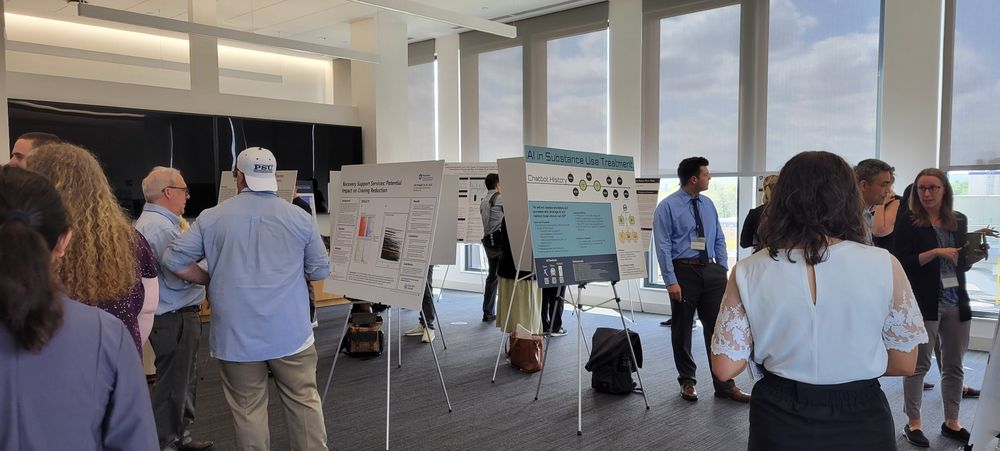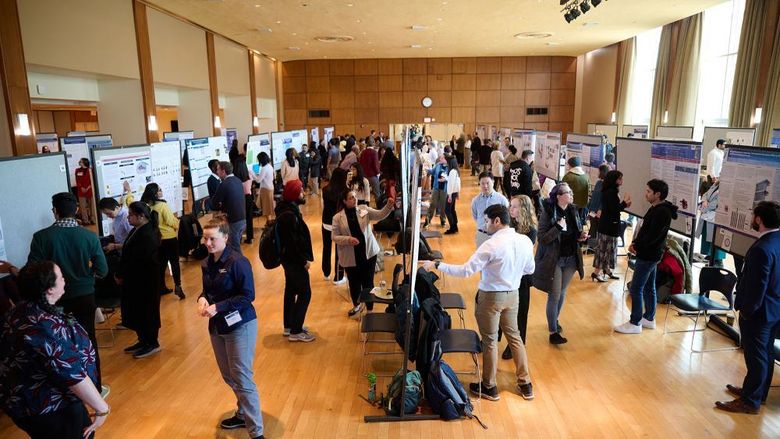
UNIVERSITY PARK, Pa. — The Social Science Research Institute’s (SSRI) Consortium on Substance Use and Addiction (CSUA) hosted its fifth annual conference in the Eric J. Barron Innovation Hub at the University Park campus in April.
Drawing over 140 attendees throughout the day including through the Zoom livestream, the conference kicked off with a welcome from Paul Griffin, the outgoing director of CSUA and professor of industrial and manufacturing engineering.
The keynote speaker, R. Lorraine Collins, State University of New York distinguished professor, associate dean for research and professor of community health and health behavior in the School of Public Health and Health Professions, and director of the Center for Cannabis and Cannabinoid Research at the University at Buffalo, presented the keynote discussion about the basics around cannabis and the complexities of use by older adults.
“Cannabis is a hot topic, has been for a while, and it’s going to get more complicated,” Collins said. “The landscape for cannabis use, products and policies is in flux, which makes it an exciting area for research, but that research must catch up.”
Following Collins’ keynote presentation, the first panel session focused on cannabis trends, implications and policy, and moderated by Emily Ansell, associate profession of biobehavioral health and CSUA affiliate. The panelists, Rina D. Eiden, professor of psychology and CSUA co-funded faculty member; Louisa Holmes, associate professor of geography and CSUA co-funded faculty member; and Gretchen Maurer, assistant professor of family and community medicine, answered numerous questions around cannabis policy and trends.
The second morning panel session, moderated by Steven Brandstetter, associate professor of biobehavioral health, focused on tobacco trends and implications. The panelists for the second session were Sophia Allen, assistant professor of public health sciences; Eric Claus, associate professor of biobehavioral health and CSUA co-funded faculty member; and Andrea Hobkirk, assistant professor of neural and behavioral sciences.
The conference featured a poster session during the lunch break, which allowed dozens of researchers and graduate students to present their work, fostering strong engagement with attendees.
Sarah Davis, graduate student of criminology, won the Best Poster Award for her work: “Judge Demographics and Their Impact on Sentencing of Drug Crimes: Using PA Commission of Sentencing Data to Examine Drug Sentencing Severity.” Abenaa Jones, CSUA co-funded faculty member, and Megan Kurlychek, CSUA affiliate and CSUA executive committee member, contributed to the poster’s research findings.
The afternoon session featured a presentation from guest speaker, Robert Snyder, about his personal experiences dealing with his son’s addiction.
“Finding resources for parents with loved ones suffering from addiction is hard, and I believe that addiction is a family-related problem, and that it needs to be treated holistically,” said Snyder, reflecting on the lack of support for families.
The remaining part of the conference consisted of two rounds of research talks from researchers across the Penn State system, and included topics such as the oxycontin reformulation, prenatal tobacco exposure in mothers, the impact of cannabis legalization on youth mental health, Delta-8 products, the impact of flooding events on substance use in rural Appalachia, and the promise of artificial intelligence in substance use disorder treatment among many others. The research talks were moderated by CSUA co-funded faculty member and assistant professor of health policy and addiction studies at Penn State Harrisburg, Sujeong Park. Lastly, the conference closed with remarks from incoming CSUA director, Joel Segel, SSRI affiliate and professor of health policy administration.
The CSUA, part of the Social Science Research Institute, draws on the expertise of researchers, educators and practitioners from across Penn State to develop and implement effective programs, policies and practices aimed at preventing and treating addiction and its spillover effects on children, families and communities.
If you missed this year’s conference, the morning session and afternoon sessions Zoom livestreams are available on SSRI’s website. There is also a gallery of photos from the event on SSRI's website. For more information about CSUA, please visit CSUA’s website.




